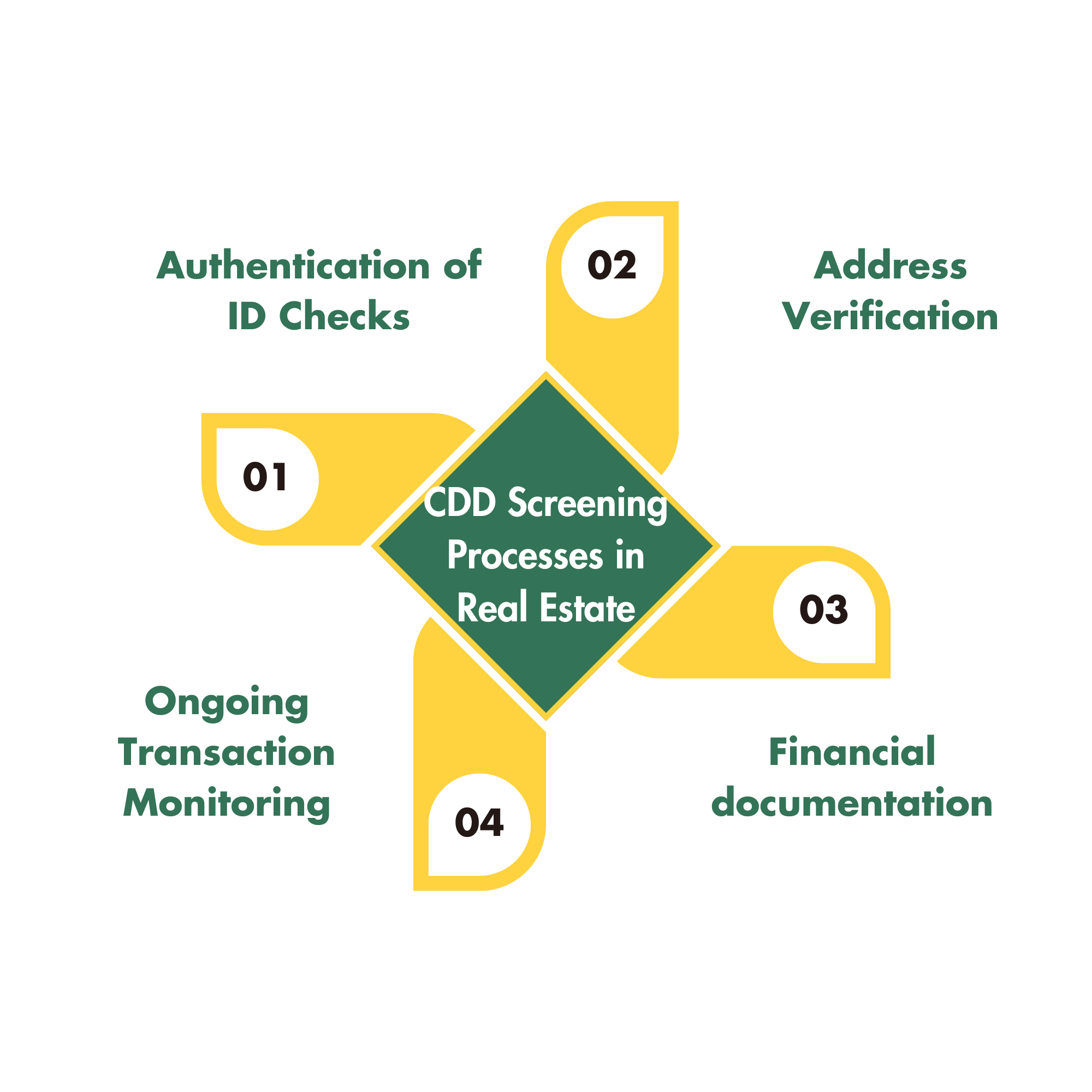Due to the high amounts of money involved in real estate deals, they are a breeding ground for fraud and money laundering. One way of bringing down these risks is to implement CDD in real estate. Customer Due Diligence (CDD) is a process aimed at ensuring all persons or institutions participating in the transaction are real and comply with the law. Since real estate is known to be the easiest concealment of assets with approximately $1.6 trillion laundered per annum globally, CDD in real estate has become an unavoidable measure to take.
This article provides explanations to CDD in real estate and its relevance in the real estate business as well as the process of its practical realization. No matter whether you are a home buyer, a seller or an investor, CDD is a part of the processes that will enhance your interaction in the market without any fears.
CDD Meaning in Real Estate: What Is CDD in Real Estate?
What does CDD in real estate mean?
Customer Due Diligence (CDD) real estate is the practice some entities such as real estate agents, banks, and other corporate or legal entities use to know their clients and their potential risks by identifying and verifying the identity of individuals. This includes all the participants, including buyers, sellers, and sometimes third parties such as agents or brokers. This is primarily to ensure adherence to Anti-Money Laundering (AML) and other related laws.
Fraud.com makes the observation that CDD is widely featured in both AML and Know Your Customer (KYC) policies. But it does not stop there: it is more than just knowing an individual, it also involves knowing the transaction that the individual is involved in so as to identify any concerns.
Major Components Of Customer Due Diligence CDD
1. The Verification of Identity
The initial part of a due diligence exercise is taking steps to know and verify that all the parties involved in the transaction are legitimate. This ensures that the parties are who they say they are.
Identity verification or KYC (know your customer) for CDD in real estate may involve either or all of the following:
- Documents Utilized: passports, national ID cards, and other suitable identification.
- Technological Innovations: Some biometric technologies such as fingerprints, face elements recognition, etc, are used.
- Real Estate-Specific Checks: This may include searching proprietary databases for current or previous owners of properties.
2. Risk Assessment
Risk engaged in every transaction is not the same. Risk assessment is done to ascertain which transactions need further attention, particularly where the clients are of a higher risk or the countries are of a higher risk.
- Financial Review: Review of bank statements, sources of income, and credit reports among other things for accuracy.
- Geographic Risk: More scrutiny may be needed for properties, clients, etc. that are associated with foreign high-risk areas.
- Enhanced Due Diligence (EDD): For cases attributed to higher risks, a more thorough examination is done with respect to the clients’ business activities, and their ties to certain political individuals, known as Politically Exposed Persons (PEPs).
As reported by Global Financial Integrity, between 2015 and 2021, over $2.6 billion was estimated to have been laundered through the US commercial real estate sector.
3. Ongoing Monitoring
CDD does not end with the completion of the transaction. Ongoing monitoring keeps track of compliance and helps in nipping any arising concerns with respect to unusual behavior or activity.
- Automated Tools: Automated software acquires the ability to detect unusual transactions as they happen.
- Regular Updates: This entails assessment of the client's records after given periods to determine if there are any developments in the client's risk structure.
- Reporting Suspicious Activity: In the case where some activities appear suspicious, appropriate measures are taken without any delay.
Read also: What are CDD Fees and how much are they?
What are the Screening Processes in Real Estate CDD?
CDD in real estate has several verification or screening processes. They may include:

Step 1: Authentication of ID Checks
The managing authority verifies the presentation of such Government-issued IDs to ascertain their validity. This process may be performed with the use of manual labour or modern instruments.
Step 2: Address Verification
Initial address claims are further verified by cross-referencing with reports of phone, gas and electric usage as well as banking account statements.
Step 3: Financial Documentation
Other documents that include monthly salaries, tax documents and other bank papers assist in ascertaining the proof of the funds used for the activity within the culture of the organization.
Step 4: Ongoing Transaction Monitoring
Monitoring transactions on an active basis reduces the risk of any irregularities occurring with respect to transactions for which long term compliance is intended.
Read Also: Key AML Compliance Challenges in Real Estate and Solutions to Address Them
Types of CDD in Real Estate
- Simplified Due Diligence (SDD): Applicable for lower-risk transactions for instance uncomplicated residential purchase.
- Basic Due Diligence (BDD): it includes the standard checks present in the majority of the real estate transactions.
- Enhanced Due Diligence (EDD): Applicable to opportunistic high risk clients or their transactions and therefore more exhaustive investigations are carried out.
Related: What are CDD Fees?: FAQ on Buying a House in Florida
What Are CDD Assessments and How Do They Show Up on Your Property Tax Bill?
When reviewing your annual property tax bill, you might notice additional line items—these are known as CDD (Community Development District) assessments. But what exactly are they, and why are they included on your bill?
Two Key Components of CDD Assessments:
1. Capital Assessment:
This portion helps pay back the tax-exempt bonds originally issued to finance vital community infrastructure. Think of major necessities such as roads, utilities, stormwater management, parks, and amenities like community pools or clubhouses. The capital assessment usually remains consistent each year until those initial bonds are fully paid off.
2. Maintenance Assessment:
Separate from infrastructure costs, this component covers the ongoing maintenance and daily upkeep of the community’s shared services and spaces—everything from landscaping and irrigation to street lighting and recreational facilities.
These CDD assessments typically appear as separate lines on your yearly property tax statement, collected right alongside your county taxes. The county tax office handles the process, which helps keep payment straightforward.
Important Note:
Not all CDD fees may qualify as deductible property tax on your federal return. Some are classified as fees rather than taxes, so it’s wise to chat with your accountant or a tax professional for guidance on your specific situation.
Why is Customer Due Diligence (CDD) Necessary in Real Estate Industry
1. Prevention of Fraud
In contradiction, asking for more information and implementing powerful CDD approaches will eliminate the existence of fraud since all the parties will be addressed.
2. Regulator Compliance
The ever-increasing need to comply with the Anti-money Laundering (AML) policies is of paramount importance in reducing the risks of suffering the consequences that accompany the breach of regulations which are often, if not always, very harsh.
3. Trust Building
The presence of transparency in the transactions enhances the trust between buyers, sellers and investors thereby building the reputation of the real estate sector.
Interesting Read: How to Conduct Due Diligence When Buying a Business in the US
Mitigate all Risks in Real Estate with Youverify's CDD solution.
CDD in real estate is the very measure that enhances safety when involved in transactions regarding real estate. It does this through identity verification, risk assessment, and activity monitoring so as to deter fraud and financial crimes against the parties concerned. A CDD process helps mitigate risks for all in the real estate transaction, be it a fresh buyer or a seasoned investor without fear or confidence in the market.
Whether you're buying, selling, or investing, understanding CDD is essential for navigating the real estate market safely and confidently. Don't leave your financial future to chance—take the first step toward secure real estate dealings today.
Contact Youverify to learn how CDD can protect your investments and ensure a smooth transaction! Schedule a demo today!
